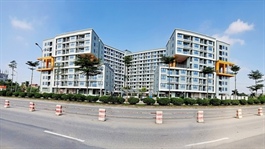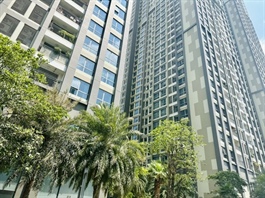Office developers inclined to incorporate ESG standards
Office developers inclined to incorporate ESG standards
Integrating environmental, social, and governance elements is the latest survival strategy for operators of leased office buildings, with experts noting that issues remain with post-pandemic workspace changes.

OfficeHaus, a newly built Ho Chi Minh City complex in Celadon City, is attracting interest from companies shifting from traditional central business districts.
With the imbalance of supply and demand in large commercial centres such as districts 1 and 3 of Ho Chi Minh City, many businesses are seeking to move to alternative locations in non-business district areas where they can effectively reduce costs.
An Infocus Mekong Research poll concluded at the beginning of the year revealed that 3.2 million people live within OfficeHaus’ 7km catchment area. Surrounding areas have a population that is slightly younger than the Ho Chi Minh City average (84 per cent in the 20-40 age group) and is more highly educated, with 79 per cent of poll respondents holding university degrees.
With more than 24 universities and 13 colleges in the vicinity, these are ideal conditions for the recruitment of a young, educated, and motivated tenants’ workforce.
OfficeHaus director Oliver Brazier said the company hears a lot about the changing needs of future generations. But it needs to look beyond just trying to predict the space these generations will need or want in office buildings.
“We should further develop office real estate so that this type can become a means that businesses can take advantage of, to bring satisfaction to their employees, and benefit from increased productivity,” Brazier said.
The OfficeHaus style is deemed a cutting-edge solution to the problems of a growing metropolis, and is LEED Gold certified. It is modelled after the Bauhaus school’s minimalist, practical architecture.
According to Bui Trang, country head of Cushman & Wakefield Vietnam, to be able to survive in the market, office building investors need to reposition, improve facilities, build sustainable services, and improve the community by creating services and events geared towards residents living and working around the property.
In addition, reuse strategies must also be considered, such as converting a building’s function into an industrial, life sciences, or healthcare property.
“In the future, office products that meet the requirements of a new generation of tenants will need many factors related to environmental, social, and governance, high technology, quality experience, and connected traffic,” said Trang.
Cushman & Wakefield’s report suggests that the link between companies’ hiring demand and job growth has not really resumed in the past year. Tenants tend to seek a smaller office space compared to the number of employees because not all will work in the office on a regular basis.
“Existing office buildings of all categories in major cities are doing quite well, with average occupancy rates unchanged on-year at 95 per cent. Although we realise that some corporations have adopted hybrid work in their operations, the majority of companies in Vietnam are still hesitant for various reasons,” said Trang.
Nicholas Michaux, the founder of financial consultants Alpha Prime, told VIR that offices for lease and commercial buildings in Vietnam are sought after by foreign investors, as returns could be higher. And in Vietnam’s big cities, houses and apartments tend to be smaller, with many generations living under one roof. This, along with the lagging technology and internet in the workplace, makes it difficult for the Vietnamese labour market to accept hybrid work.
“From a perspective of a foreign fund-raiser and consultant, I see many commercial assets in Vietnam are on the radar of foreign investors. The point is which ones should be appropriated for their demand,” Michaux said. “With international and local companies still increasing their need to upgrade office space, increase headcount, and expand operations, the office market will continue to perform strongly for the next decade.”
A Knight Frank Vietnam report on Q1 indicated that Grade A office space for lease in Ho Chi Minh City had a stable vacancy rate of 4.9 per cent, the same as it was last year. However, the market will have great fluctuations thanks to the addition of supply from more than 131,000 square metres of office space that are about to come into operation within the next 12 months. Therefore, the vacancy rate might be increased up to 25 per cent.
Leo Nguyen, director of Strategy and Tenant Solutions at Knight Frank Vietnam, commented that this oversupply situation has not happened for over 10 years, and advises building owners to be prepared to face challenges when the office market shifts in favour of tenants.
“We will see a major increase in Grade A office supply in Thu Duc city and south of Ho Chi Minh City. Especially noteworthy is the new supply of nearly 100,000sq.m in the central area and Thu Duc, respectively, with extremely competitive rents,” said Nguyen.
Knight Frank also predicts Grade A office rents will fall by over 17 per cent over the next three years.
The business result of the Grade B office segment has also tilted more towards tenants faster than analysts had anticipated, and can be taken as an indicator of what is to come on a larger scale. This segment will receive an addition of under 300,000sq.m of floor space by 2025, thereby nearly doubling the vacancy rate to 23 per cent. This is the largest Grade B vacancy rate in the market for over a decade now, and Knight Frank experts forecast it to remain above 10 per cent over the next year or two.
Nguyen commented that the prediction of around a quarter of Grade A/B offices for lease in Ho Chi Minh City to be vacated is unprecedented. “Because of that, this is an ideal time for tenants to discuss with landlords and consultants on the term and the future office rental price,” he said.




















